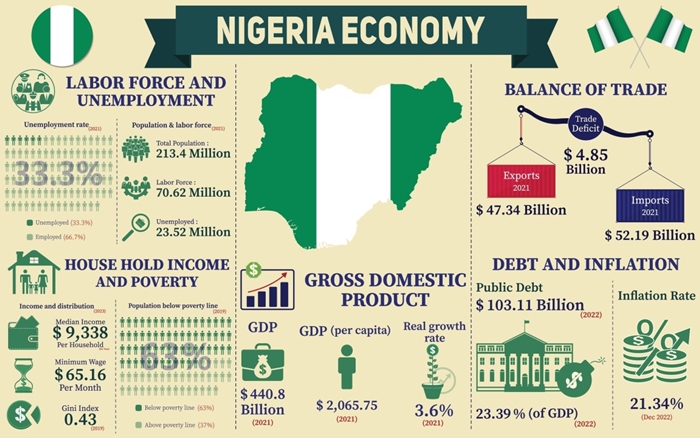In this article, we discussed how to improve economic growth in Nigeria. We started by defining the meaning of economic growth.
Definition
Economic growth refers to an increase in the size of a country’s economy over a period of time. The size of an economy is typically measured by the total production of goods and services in the economy, which is called gross domestic product.
Economic growth occurs when there is a rise in the production of goods and services for a certain period as compared with a previous one. It is generally measured in terms of GDP and is an indicator of the economic health of a country.
How to improve Economic Growth in Nigeria
Here are some key steps to consider:
Fiscal and Debt Management:
Debt Restructuring: Exchange with creditors to restructure and extend the youths of debt, allowing for more manageable repayments and reduced interest rates.
Austerity Measures: Implement fiscal discipline by reducing non-essential government spending, eliminating wasteful subsidies, and improving the efficiency of public services.
Revenue Diversification: Expand the tax base, improve tax collection, and introduce new sources of revenue, such as value-added tax (VAT) and property taxes.
Transparency: Improve transparency and accountability in government spending to build public trust and attract foreign investment.
Monetary Policy:
Inflation Control: The central bank should continue to employ tight monetary policy to combat inflation, which is often associated with stagflation.
Interest Rates: Maintain positive real interest rates to attract foreign investment and encourage savings.
Exchange Rate Management: Maintain a competitive exchange rate to stimulate exports and reduce reliance on imports.
Structural Reforms:
Deregulation: Further ease up key sectors of the economy, such as energy and telecommunications, to attract private investment and foster competition.
Trade Facilitation: Restructure trade processes and reduce trade barriers to boost exports.
Infrastructure Investment: Invest in critical infrastructure, such as transportation, energy, and
technology, to reduce blockages and improve overall productivity.
Human Capital Development:
Education and Skills: Enhance education and vocational training to build a skilled workforce that can meet the demands of a growing and diversified economy.
Healthcare: Improve healthcare services and public health to increase labor force productivity and reduce health-related costs.
Economic Diversification:
Reduce the heavy reliance on oil exports by promoting other sectors like agriculture, manufacturing, and technology.
Support small and medium-sized enterprises (SMEs) to foster entrepreneurship and innovation.
Investor Confidence:
Create a stable and predictable investment environment by applying and enforcing clear and consistent policies and regulations.
Encourage foreign direct investment (FDI) through investment-friendly policies and incentives.
Social Safety Nets:
Implement social safety nets to protect exposed populations during economic reforms.
Technology and Innovation:
Promote innovation and technology adoption to enhance productivity and attractiveness.
Regional and International Collaboration:
Collaborate with regional and international organizations to access financial assistance, expertise, and market opportunities.
Public Awareness and Support:
Engage with the public, businesses, and civil society to gain their support for economic reforms.
Addressing stagnation and achieving sustainable growth in Nigeria will require a comprehensive and coordinated effort from the government, the private sector, and the international community. It will take time, and progress may be gradual, but with the right policies and sustained commitment, Nigeria can work its way toward economic stability and growth.
Conclusion
Addressing longstanding and potentially binding constraints to growth are crucial for Nigeria to sustain stronger growth. This requires reducing trade barriers, improving trade facilitation, increasing access to reliable power supply, and improving the business environment.


